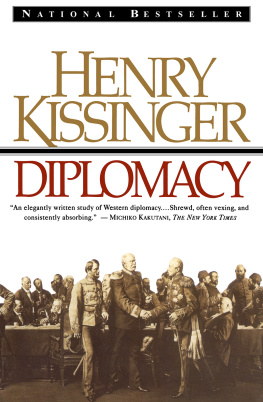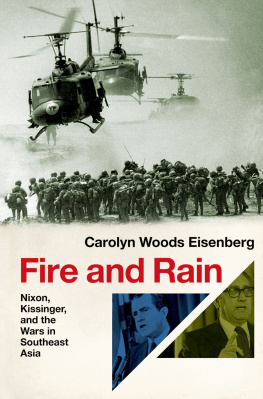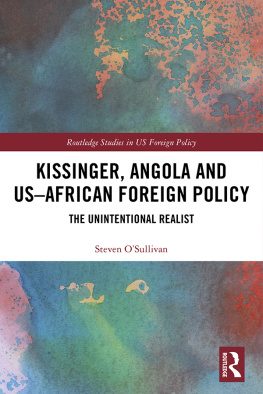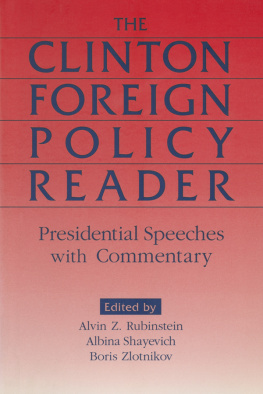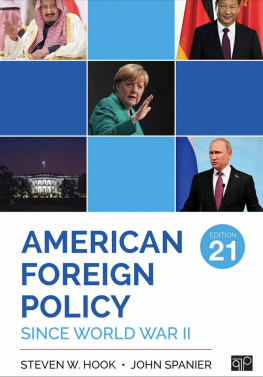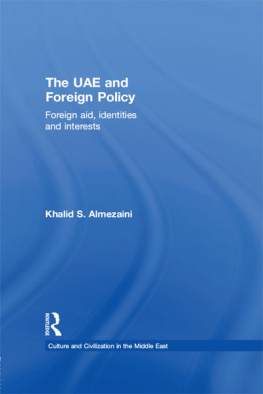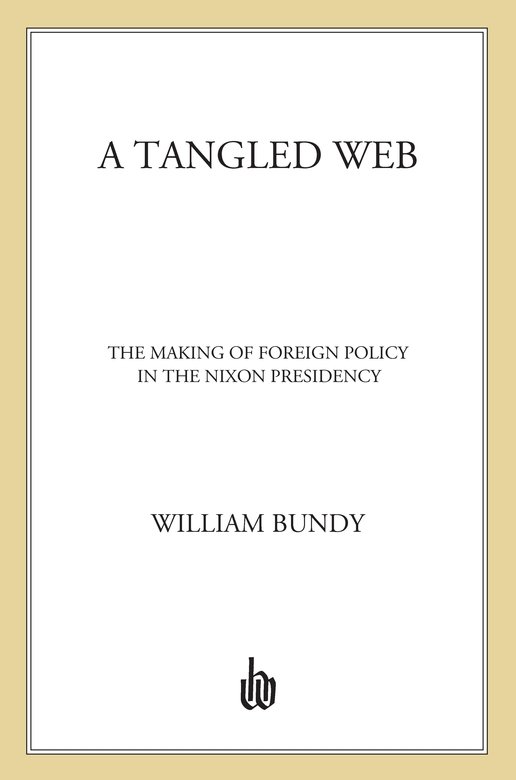A writer of history, especially one inexperienced at book length and working without full-time assistance, accumulates numerous debts to individuals. Without their help and advice, I could never have accomplished the necessary research or completed the writing and revision.
My first debt is to Dr. David Hamburg for a generous start-up grant from the Carnegie Corporationsimply to writewhen I retired from Foreign Affairs in 1984. After an interval in which, among other things, I taught part-time at Princeton, Arthur Rosenthal signed up the book with Hill and Wang on the basis of a limited draft and outline.
For the past four years of more intensive work, my mainstay, publisher, and editor has been Elisabeth Sifton, who patiently accepted a major enlargement of the original outline, made excellent basic suggestions, and worked incredibly hard for months to improve my prose and guide me to rethinking as well as rewriting the text. Lauren Osborne has joined in the editing and kept the manuscript, the endnotes, and all the auxiliaries straight with great care and skill, along with her assistant, Susan DeCarava. It has been a pleasant as well as constructive relationship, for which I am indirectly indebted also to Roger Straus, the legendary head of the parent firm of Farrar, Straus and Giroux.
I have had priceless help from a series of research assistants, mostly graduate students at Princeton University. Over more than five years, Jennifer Delton in particular not only did useful research and typed voluminous notes but handled the bibliography throughout and was in the last phase asuperb decipherer of text changes, editor, and critic. Kara Stibora Fulcher did research and typing with great ability for more than two years, and Karen Vasudeva came to my rescue on several occasions, notably in handling text changes in the last phase. Before them, Sheila McNeill Riggs was the pioneer, and Mark Easton, Mark Sandy, and Patricia Labaw all helped at the early stages.
Many friends have read and criticized draft sections of the manuscript. Gail Ullman, John Zentay, Robert Bowie, and my onetime colleagues Blanche Moore and Daniel Davidson did so for the whole draft text, supplying a host of valuable comments. William Roth, Harry McPherson, and my brother McGeorge read chapters and gave me solid advice at an intermediate stage, and my colleague at the State Department and lifelong friend, Marshall Green, not only read and criticized large parts of the manuscript but contributed important recollections of his own association with President Nixon. Others who read and commented usefully on individual sections were Alfred Atherton, Nayan Chanda, Cyrus Ghani, G. McMurtrie Godley, John Holdridge, Paul Kreisberg, Winston Lord, Douglas Pike, Robert Pursley, John Rhinelander, Harold Saunders, Robert Scalapino, and Emory Swank. Needless to say, the responsibility for content remains wholly mine.
I have profited from wide-ranging interviews with William Hyland, Charles S. Levy, Jonathan Moore, Elliot Richardson, and Ted Van Dyk. On individual points, I have turned, usually by telephone, to a number of former colleagues and senior figures in the Nixon period, as well as to authors or sources from my time at Foreign Affairs . These have included James Akins, George W. Ball, Lucius D. Battle, Joseph Califano, Jeffrey Clarke, Kenneth Dam, Nathaniel Davis, Jonathan Dean, Raymond Garthoff, Robert Goheen, Philip Habib, Norman Hannah, Richard Helms, Seymour Hersh, Arthur Hummel, John Irwin, U. Alexis Johnson, Max Kampelman, Nicholas Katzenbach, A. James McAdams, Charles Meyer, Thomas Moorer, Russell Mott, Paul H. Nitze, Don Oberdorfer, Rutherford Poats, Stanley Resor, Walt Rostow, Kenneth Rush, John Sawhill, Paul Sigmund, Monteagle Stearns, William H. Sullivan, Cyrus Vance, and Christopher Van Hollen.
For written materials, the staff of the Princeton University Library has been uniformly helpful. For certain CIA materials (in the public domain) I have been greatly helped by my old colleague Harold Ford, and on one key matter by Ben Fischer of the Agencys Center for the Study of Intelligence, to whom I was guided by Diane Snyder. Jane Smith of the recently established Center for Diplomatic Studies and Training in Arlington, Virginia, introduced me to their rapidly expanding collection of oral histories by diplomats. Likewise Alfred Goldberg, Historian at the Office of the Secretary of Defense in the Pentagon, showed me useful oral histories and amassive file of daily media summaries that only distance kept me from using properly.
To thank all these people is to realize again how far my researches have fallen short of the standards of my mentor in diplomatic history, William L. Langer. This is not a fully scholarly account of its subjectbut then I doubt that, with the explosion in information technology, there will ever be even the semblance of one for the Nixon period, or perhaps for any other in recent American history.
I owe special thanks to Dr. Andrew Costin, whose resourceful care restored my health and energy after a lull two years ago.
Finally, our children, Michael, Carol, and Chris, have been wonderfully understanding of my distracted state for now many years. My wife, Mary, has encouraged and supported me at every stage, criticizing intermediate drafts trenchantly and, in the crunch of the past year, reading and annotating the complete text three times with great care and insight, as well as bearing the whole household load. Her taste, her eye for precision and clarity, and her ear for tone have made incalculable improvements, and her humor and patience have lifted us over many shoals. The dedication of the book to her is the merest token of my gratitude and love.


